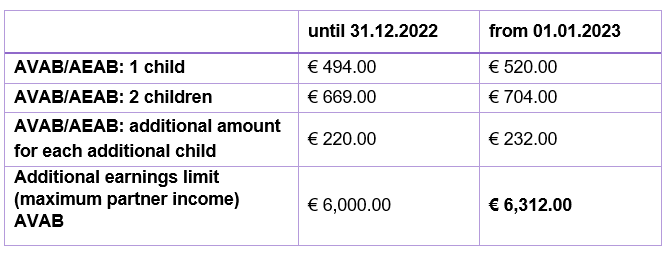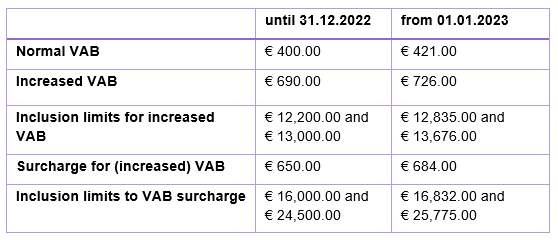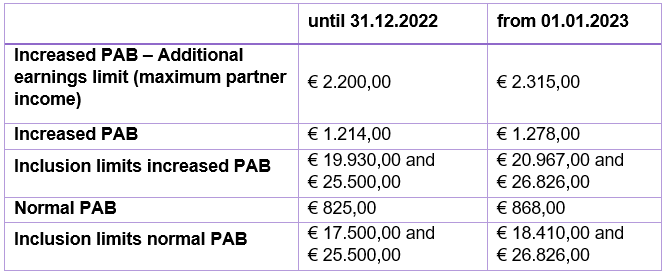-
Corporate Tax
We are your problem solvers for corporate tax issues
-
Restructuring, Mergers & Acquisition
Expertise and creativity for the perfect structure
-
International Tax
We are here, whenever our clients require our assistance
-
Transfer pricing
We are your experts for an optimal transfer pricing structure
-
Indirect Tax & Customs
We take care of your indirect taxes so you can take care of your business
-
Private Wealth
We are your competent partner in the field of Private Wealth Tax Services
-
Real Estate Tax
We are a valuable partner at every stage of your property's life
-
Global Mobility Services
Local roots and global networking as a secret for successful assignment management
-
Advisor for Advisor
As advisors for advisors, we support in complex situations
-
Accounting & Tax Compliance Services
Grant Thornton Austria - Your Partner for Experts for Accounting & Tax Compliance Services. In an evolving regulatory landscape, efficient accounting, tax compliance, and financial statement preparation processes are crucial for maintaining an accurate and up-to-date view of your company’s financial position while ensuring compliance with all legal requirements. We provide tailored solutions that not only save your time and resources but also ensure compliance with complex regulations. Our experts are here to support you, allowing you to focus on your core business.
-
Payroll & People Advisory Services
Ensuring Compliance, Efficiency, and Strategic HR Solutions In an evolving legal landscape, it is crucial for companies of all sizes to have efficient and legally compliant payroll accounting systems. The ever-changing regulations and increasing complexity make this an ongoing challenge. At Grant Thornton Austria, we provide comprehensive, precise payroll processing as part of our Payroll & People Advisory Services. Additionally, we offer customized advisory services to help clients optimise their HR strategy, improve operational efficiency, and minimize potential risks.
-
Tax Controversy Services
Your Partner when it matters most! In increasingly complex environment and considering frequent changes in tax regulations, businesses are facing intensified scrutiny from tax authorities. This has resulted in a significant rise of complex tax audits, investigations and potential disputes. Our Tax Controversy Services are tailored to help you navigate these challenges proactively and effectively. Our experts will guide you through all stages of tax proceedings, ensuring robust defence of your position and advising you on preventive measures to minimize the risk of future tax disputes.
-
Tax Technology Services
Your digital partner for an efficient future! In an increasingly digitalised business world, companies must constantly look for optimisations and adjustments to ensure their long-term success. In order to best prepare for the future and to achieve efficiency increases and process optimisations in the digital area, the experts at Grant Thornton Austria are at your side as a reliable partner as part of our Tax Technology Services.
-
Audit of annual and consolidated financial statements
We place particular emphasis on customized solutions and international service and adapt our services to your needs.
-
Assurance related advisory services
Assurance related advisory services are based on the knowledge and expertise that are the staff of life of our auditors.
-
Global audit technology
We apply our global audit methodology through an integrated set of software tools known as the Voyager suite.
-
Accounting related consulting
Accounting in accordance with UGB, US-GAAP or IFRS is in constant motion. The integration of new regulations into their own accounting systems poses special challenges for companies.
-
Valuation
Valuations are a core competence of Grant Thornton Austria. As auditors and tax advisors we combine profound know-how with our practical experience to offer you customized solutions for your valuation assignment. Our industry expertise is based on years of services to our clients, including listed companies as well as owner-managed companies with an international focus. We advise on valuation matters related to arbitration and provide expert opinions.
-
Forensic Services
When it comes to risks in business, our experts are on hand. We support you not only in suspicious cases or in disputes, but also develop suitable strategies in the area of prevention to avoid serious cases as far as possible. Our Cyber Security team helps you to keep your networks and applications secure and is quickly on hand in the event of a security leak.
-
Cyber Security
Cyber incidents, IT system failures, the resulting business interruptions and the loss of critical data are one of the greatest business risks for companies. Recent cases underline the need for strategic protection and awareness of the issue and require a holistic approach and technical expertise that takes into account all legislative, regulatory and technical aspects of cyber security to protect companies against the daily increase in cybercrime incidents.
-
Sustainability Services
Sustainability is no longer a trend, but the only way to create a future worth living. Our experts will support you in successfully developing your sustainability strategy and preparing your sustainability reporting in compliance with regulations.
-
Transaction Support
We can support you throughout the transaction process – helping achieve the best possible outcome at the point of the transaction and in the longer term.
-
Merger & Acquisition
Companies start new activities and separate from old ones, cooperate and merge. Markets and competitive conditions are subject to constant and increasingly rapid change. As a result, existing business models are changing. Some companies have to restructure and reorganize. But new business opportunities also open up.
-
Restructuring & Going Concern Forecast
Restructuring & Going Concern Forecast: Bundled services for your strategic, operational and financial decisions offer the right answers for companies, banks, shareholders and investors.
-
Internal Audit
Internal Audit helps companies and organisations to achieve their goals by analysing and evaluating the effectiveness of risk management, controls and management and monitoring processes. Internal Audit focuses on independent and objective audit (assurance) and consulting services that improve the value creation and business activities of your company.
-
Expert dispute resolution & advisory
Grant Thornton Austria offers comprehensive services in the field of business-oriented expert services with a broad range of competencies from banking to communication. The core activity of experts is the objective recording of findings and the preparation of expert opinions - regardless of all external circumstances. Our experts Gottwald Kranebitter and Georg H. Jeitler, as sworn and court-certified experts, ensure that the highest professional standards and the principle of objectivity are observed.
-
Blockchain and Crypto-Asset
Blockchain as a carrier technology for crypto currencies and smart contracts, among other things, is becoming increasingly important. Grant Thornton Austria offers comprehensive audit and confirmation services for block chain technologies and business models.
-
International Project Coordination
Our International Engagement Management team is your central point of contact for international projects in all our service lines. We take care of operational project management for you and act as a central point of contact and coordination for your projects. We support companies that start international projects from Austria as well as companies from abroad that want to gain a foothold in Austria or use Austria as a hub for their international projects, especially in the DACH (Germany, Austria and Switzerland) and CEE region.
-
International Desks
As a member of the Grant Thornton network, we guarantee direct access to resources from our worldwide circle of partners. This global connection enables us to seamlessly integrate highly qualified specialists and industry experts from different countries around the world into our teams. Through our broad perspective and diverse expertise, we ensure that we can optimally meet the individual requirements of our clients in an increasingly globalised economy.

Deductions (Tax Credits) and Limits of Additional Earnings as of 01.01.2023
Childcare Allowance: New Limits for Additional Earnings as of 01.01.2023
The limit for additional earnings for childcare allowance recipients (lump-sum system independent of earnings) will increase from EUR 16,200.00 to EUR 18,000.00 as of 01.01.2023. For recipients of the earnings-related childcare allowance, the limit for additional earnings will increase from EUR 7,600.00 to EUR 7,800.00 per year.
Sole-Earner Deduction/Single-Parent Deduction (AVAB/AEAB) § 33 Abs. 4 Z 1 and 2 EStG 1988

Alimony Deduction § 33 Abs. 4 Z 3 EStG 1988

Transportation Deduction (VAB) § 33 Abs. 5 Z 1 - 3 EStG 1988

Pension Deduction (PAB) § 33 Abs. 6 EStG 1988

Commuter Allowance in Conjunction with Travel Allowance/Job Ticket
Commuter allowance and reduced public transport ticket regulations up until 31.12.2022
Until 31.12.2022, the following applied: If the employer provided tickets or (partially/fully) reimbursed the costs for public transportation (‘job ticket’), the employee was in most cases not entitled to the commuter allowance. This applied regardless of whether the job ticket could be used for the whole commute or just part of the route.
Commuter allowance in conjunction with travel allowance and job ticket as of 01.01.2023
As of 01.01.2023, the commuter allowance is calculated in a first step without consideration of any public transportation tickets provided/reimbursed by the employer. Subsequently, that amount must be reduced by the value of the public transport ticket.
In case of a one-third commuter allowance claim, the allowance must be divided by three and subsequently reduced by the value of the public transport ticket (the commuter euro must also be divided by three).
The commuter euro is due for the entire distance (home-workplace), even if the commuter allowance is zero due to the deduction of the commuter allowance. If the public transport ticket is available for longer periods than one calendar month, the monthly contribution is determined on a proportional basis.
Mandatory Personal Income Tax Return – Additional Triggers
Inflation Premium
In the year 2022 and 2023, the employer may pay a tax-free and contribution-free inflation premium to their employees of up to € 3,000.00 per employee per calendar year (special payment).
If more than one employer pays an inflation premium within the same calendar year (either parallel employment relationships or consecutive employment relationships), and the sum of the paid inflation premiums exceed the limit of € 3,000.00, the tax-exempt amount of € 3,000.00 must be split between the employments proportionately.
Employees who receive tax-free inflation premiums of more than € 3,000.00 per year are subject to mandatory income tax returns. This is to make sure that any inflation premium exceeding € 3,000 is taxed correctly (taxable income).
The tax-free inflation premium will not affect the entitlement to an early retirement pension. Likewise, the childcare allowance remains unaffected by the granting of a tax-free inflation premium (applicable to both childcare allowance systems: earnings-related or lump-sum).
The inflation premium for 2022 can be paid retroactively until 15.2.2023 (payroll roll-up). This offers a last chance for late filers.
Employee shares
The mandatory PIT return will also be triggered if the sum of tax-free employee shares and tax-free inflation premium exceeds the total amount of € 3,000.00.




